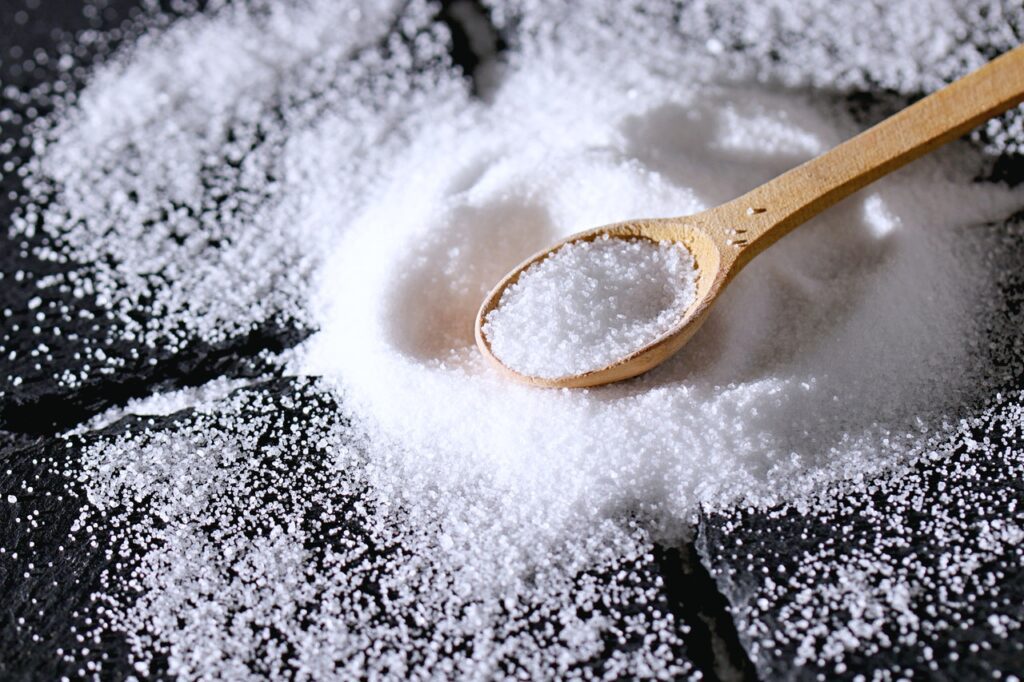How much sodium per day to lose weight? Fast food, junk, and packaged foods contain high amounts of salt. It is natural to gain weight by consuming more of them. These foods contain more dietary fat as well as more calories. Fruits, lean proteins, whole grains, and low-fat dairy products should be taken to control weight. Small amounts of sodium are found in them.
How much sodium should be eaten in a day?
Consuming too much sodium leads to weight gain and water retention in the body. Less than 2300 mg of sodium should be consumed in a day. Some people have problems with sodium sensitivity. In this situation, less than 1500 mg of sodium should be taken per day. Apart from water retention and weight gain, sodium can also cause high blood pressure.
Why does the body need sodium?
Sodium is an electrolyte. The cells of the body conduct electricity through it. The function of skeletal muscle cells and the heart depends on sodium. But due to consuming too much sodium, water starts accumulating in the body due to which it is not able to work properly.
How to reduce sodium intake?
- Sodium intake can be reduced by making changes in your lifestyle and diet.
- Reduce the consumption of packaged and junk food. It contains more calories, fat, and sodium.
- Always eat natural food like vegetables, lean protein, fruits, and whole grains.
- Do regular exercise.
- Drink enough water to flush out the excess sodium stored in the body.
- Consume any food only after checking the amount of sodium.
You may have never thought before, but, indeed, the amount of salt you eat can also affect your obesity. Let us tell you that due to excessive consumption of salt, problems of obesity can take place. Further in this article, we will be discussing how much salt a person should eat and how more salt can result in weight gain.
Problems caused due to excessive intake of sodium-
Water starts stagnating –
When you start consuming too much salt, it causes more water to stay in your body. Due to this, you start gaining weight. Although this is not a big problem, because if you reduce the intake of excess salt, then the water will come out and the weight will be reduced again.
Hunger starts –
Whenever you eat too much salt, you start feeling hungry very quickly. Therefore, whenever you plan to purchase outside packaged food, read the label, and avoid excessive amounts of sodium. Also, salty processed foods are high in sugar which can also cause major health issues in your body.
Increase in the levels of insulin –
It has been revealed in various types of research that when you eat too much salt, then more amount of insulin gets deposited in your body. Due to the increase in insulin, fat remains in the body, and as a result body weight increases.
Salt is an essential electrolyte, but you should consume it in moderation, especially if you are consuming processed foods and salt from refined resources.
Now that we know the science behind the consumption of sodium and how it can impact our bodies, the next question that arises is what amounts of sodium should be consumed so that it does not have adverse effects on our bodies.
How much salt should be eaten?
Like other elements, our body also needs sodium, which is found in high amounts of salt. Therefore, the consumption of salt is very important for our bodies. According to the dietary guidelines for Americans, a person should consume no more than 1500-2000 mg of sodium in a day.
Many health disorders and other problems like high blood pressure start due to excessive amounts of sodium and it can also become the cause of any major disease. On the other hand, if salt is eaten in small amounts, it can also be harmful to the body.
Therefore, the body of a completely healthy person needs less than 6 grams of salt every day i.e. about one teaspoon, but Indians take 8 to 10 grams of salt in their diet every day through various means.
However, it is said that people with high blood pressure should not eat more than 2/3 teaspoons or less than one teaspoon (1600 mg sodium) of salt per day.
Recently many new arguments are being made about salt. Years of research are being challenged. It is being said that salt is not a villain, which we have to eliminate from our food. Rather it is important for our health.
The most important element in salt is sodium. By creating the right level of water in the human body, sodium helps carry oxygen and other nutrients to all organs. Not only this, sodium adds lightning to our nerves. But, historically, it has been advised to eat less salt.
In India, fasting food is prepared without salt. It is said that it is a part of Tamasi food. There will be many people in India, who eat food without salt. But, these examples are limited.
We have been eating a lot of salt for centuries. We eat many times more salt than the standard set by the World health organization. All the efforts of the governments have failed to reduce the consumption of salt.
According to the guidelines, no person should eat more than six grams of salt in a day. On average, every citizen in the UK uses 8 grams of salt a day. At the same time, in America, this number is 8.5 grams. According to Australia’s George Institute of Global Health (SOURCE), the average Indian consumes around 11 grams of salt a day, which is almost double the recommended norm.
Everything that comes from the market contains more salt than the prescribed standard. Salt is added to bread, soups, and cereals.
The problem is compounded when packaged products contain sodium instead of salt. It seems that we are eating less salt, whereas the reality is quite the opposite. Salt also contains sodium and chloride ions. There is 1 gram of sodium in 2.5 grams of salt. But, people think of sodium as the number of salt.
What does the research say?
It has been proven many times by research that eating more salt increases blood pressure. This increases the risk of heart attack and other heart diseases. Most experts are unanimous about the harm of salt. ( SOURCE)
When we eat more salt, more water gets stored in our body and Hence Its pressure falls on the kidneys. They have to work hard to clean this water. If this happens for a long time, there is a complaint of increasing blood pressure for more days. This is called hypertension.
This hypertension is the major cause of 62% of cases of heart attacks. Hypertension is also the cause of 49 percent of the diseases of the heart tubes. According to the World Health Organisation, 23% of people in India die of cardiovascular diseases.
Eating five grams of salt daily above the recommended norm increases the risk of heart and artery disease by 17 percent. At the same time, the risk of heart attack increases by 23 percent.
By consuming less than 1.4 grams of salt daily, the problem of increased blood pressure is reduced by 42 percent. The number of heart attacks is also reduced by 40 percent.
However, it’s still not a proven fact with certainty that this reduction in blood pressure or the risk of heart attacks came from simply reducing salt intake. People who eat less salt generally have better health. People who are aware exercise regularly. Don’t smoke or drink alcohol. And all these good healthy lifestyles combined affect your overall physical and mental health and not just one ingredient or food item.
Francesco Cappuccio of the University of Warwick, UK, says that it is not possible to assess the direct effect of salt on the body based on a few experiments.
In the 1960s, the Japanese government launched a massive campaign for their citizens and appealed to the people to eat less salt. As a result of the campaign, the average consumption of salt in Japan has come down from 13.5 grams to 12 grams per day. During this period, deaths due to heart attacks and problems with blood pressure decreased by up to 80 percent.
Daily consumption of salt in Finland fell from 12 grams in the 1970s to 9 grams per day in 2002. As a result, there was a decline of up to 80 percent in other heart diseases, including heart attacks.
It is not possible to justify this research for every human being. The reason is that the effect of salt on every person is different. The effect of salt on every person is different according to caste, religion, community, age, and body mass index. A family history of hypertension also plays an important role in this.
Disadvantages of eating less salt or Dangers of Underconsumption
File consuming high amounts of salt can have negative effects on your health similarly if your consumption of salt is very less according to the standard consumption then it can also have opposite effects as well. (SOURCE)
Many scientists are also saying that even eating too little salt can cause blood pressure. Eating less than 5.6 grams of salt daily can also cause a heart attack. It is sure to have a bad effect on health.
According to research done on one lakh 70 thousand people, eating less than 7.5 grams of salt per day increases the risk of heart disease. On the other hand, by eating 12.5 grams of salt daily, these conditions get better. Whereas in Britain it is twice the salt than the prescribed standard.
Andrew Mante, who was the leader of this research campaign against low salt, teaches at the University of Ontario. They say that by eating less salt, there are fewer chances of problems relating to high blood pressure, but it does not directly benefit health.
Andrew Mente says that instead of consuming too much or too little salt, we have to choose the middle path. Intake of too much salt is also poisonous whereas less salt is also harmful. That is, the road remains only in the middle.
But, not everyone agrees with Andrew Mante. Cappuccio of the University of Warwick says that eating less salt lowers blood pressure. He calls the research of those advocating eating more salt incomplete.
Sarah Stanner, a member of the British Nutrition Foundation (SOURCE), says that reducing the amount of salt reduces problems ranging from blood pressure to heart attacks. There would be very few people who would eat less than 3 grams of salt daily. This number is a sign of danger.
Sarah Stanner says that it is impossible to eat very less amounts of salt on today’s date. Because we eat a lot of things bought from outside, in which there is a lot of salt. The need is that the quantity of salt in the food items sold in the market should be reduced.
The opinions of experts are also divided on the fact that after eating excess salt, it can be reduced by exercising or exercising regularly.
She also believes that the ill effects of salt can also be reduced by eating green vegetables, fruits, nuts, and milk products because they contain potassium.
Sue Matius of Lancaster University says that we have to worry more about the salt in canned and packaged goods. The salt that we eat by ourselves is very less. Fulfills our daily needs.
Sue Mattias says, “Eating too much or too little salt, both are not good for us.”
Mattias advises, “Excess salt is harmful, but completely abstaining from eating it is also not good.”
Should You Limit Your Intake?
Sodium is found in high amounts in these five things – seafood, cheese salt, packaged juices, chicken, etc. Hence you must try reducing their intake from today itself.
Many essential elements are required to keep the body healthy and fit, and sodium is also an important element among these essential elements. Sodium is a useful element for the body that regulates blood pressure.
Although all the health authorities continue to influence pushing for lower sodium intake, if you consume it below 3 grams per day it may negatively impact your health. Therefore you must eat the recommended intake and it is a good idea to limit your overall intake and try not to consume more than 7 grams per day.
Recent Posts
- Sumo Deadlift High Pull
- Sumo deadlift dumbbell
- Costco croissant calories
- What does dragon fruit taste like
- Jelly fruit




